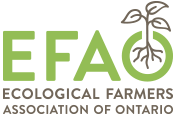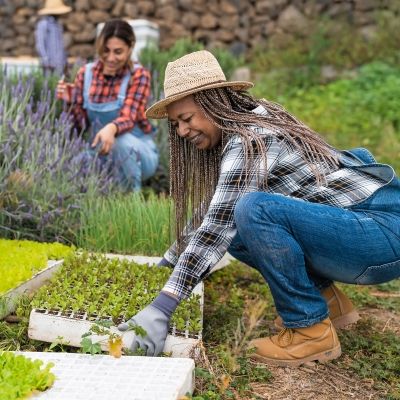This blog post is part of a two-part series about EFAO’s beginning steps in addressing anti-racism and equity within agriculture. Part One shared insights and thoughts from Angel, Amy, and Ali on EFAO’s equity work to date, while this second part highlights key feedback that we have received so far from EFAO’s BIPOC Farmers Network via the BIPOC members survey.
In December 2020, EFAO began a series of foundational steps to engage with BIPOC farmers to understand how the organization can better serve this underrepresented sector of the farming community. One of these steps was sharing a BIPOC members survey with EFAO’s BIPOC Farmers’ Network, a group with 70+ members representing urban and rural racialized farmers and aspiring farmers. There were 35 respondents to this survey (approximately 50% of the network), and just over 60% identified as aspiring or new farmers (i.e farming for less than 5 years). Community members generously shared information and feedback about their farming experiences, interests, challenges and needs.
We thank all participants for your sharing. All feedback has been shared with EFAO staff, board, and the BIPOC Network. The insights shared are truly valued by the EFAO and will inform current and on-going programming decisions, along with on-going consultation and collaboration with the BIPOC Farmers’ Network and the pending BIPOC Equity and Accountability Committee.
What We Heard
Below are some of the key themes, interests, concerns, and needs that respondents shared, as well as quotes that highlight individual BIPOC voices.
Land Access
“I live in Mississauga and have had trouble finding supports and access to land – which is ironic because Caledon is just 30 minutes away!”
“Imagine if we had a framework for getting more people access to land and (modest & sustainable) housing and infrastructure, with walking distance community and mentor-ship, putting way more people on the land in diversified farming systems — as a Toronto kid (BIPOC or not) that would have allowed me to get into farming 10 years earlier . . . on top of how many systemic issues that would help solve.”
“Well, land and capital go hand in hand. I do not come from a family that had any capital so it has been difficult to accumulate the amount of Capital necessary to purchase land.”
Key Comments:
|
Capital & Finances
“Difficulty accessing capital to afford critical equipment and infrastructure. We do not have the privilege to leave our full time jobs to fully commit to our farm as that would leave us in an extremely precarious and impossible situation. Having capital to give us that buffer not only gives us the funding we need but also allows us to more confidently dive full time into our farm business.”
“I have been turned away for traditional lending and have had to seek out micro loans and grants to carry my business along.”
Key Comments:
|
Community & Representation
“I attended the conference in Belleville and learned a lot and also was very inspired. Thank you! I did feel quite alone as I was one of the only BIPOC attendees out of a sea of white farmers/members. It felt like the other farmers had the privilege of generational connections and networks and already knew each other or at least felt comfortable with each other. I tried my best, but definitely had a lot of anxiety during the networking/social parts of the conference. I loved the workshops and appreciated the two Indigenous-led workshops. I think more BIPOC-led and focused workshops/socials will be so helpful.”
Key Comments:
|
Education
|
Key Comments:
|
Systemic & Organizational Change
“If we do not acknowledge the real history, how can we acknowledge our place (and role) in our present day agricultural & food systems? And if we do not know our role and place in the system, how can we change it?”
|
Key Comments:
|
Since December 2020, much work has been done to “prep the ground” for addressing systemic racism and equity in agriculture. The “mycelium” network of EFAO BIPOC farmers continues to grow, many new ideas and questions have been seeded — some have already germinated and are being nurtured towards fruition. We are very excited and grateful to be working within such an engaged and caring membership.
You can learn more about EFAO’s progress with its anti-racism and equity work on our Anti-Racism in Farming page, and find a summary of the BIPOC Farmer Survey findings in Part 2 of this article. If you have any questions for Angel, Amy or Ali, please don’t hesitate to reach out!

